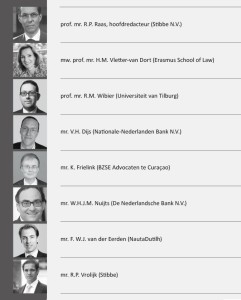TOEZICHT TRUSTKANTOREN IN NEDERLAND
Derde geheel herziene druk
Op 1 januari 2019 zijn de Wet toezicht trustkantoren 2018 en het Besluit toezicht trustkantoren 2018 in werking getreden, tegelijk met de Regeling toezicht trustkantoren 2018. Hiermee zijn de regels voor trustkantoren en hun cliënten ingrijpend veranderd. De nieuwe editie van Toezicht trustkantoren in Nederland helpt hen de balans op te maken, met een grondig overzicht van regels, rechtspraak en literatuur.
De wet- en regelgeving is sinds de verschijning van de vorige druk in 2010 zodanig gewijzigd, dat een grondige herziening van dit handboek op zijn plaats was. Naast de inhoud is …
Read the rest »
WET FINANCIEEL TOEZICHT IS ÉÉN GROTE PUZZEL GEWORDEN
Door de bomen het bos niet meer zien
In Het Financieele Dagblad van zaterdag 3 december 2016 staat een artikel over uiterst complexe wetgeving. De Nederlandse Wet op het financieel toezicht (Wft) is, zo blijkt uit dit artikel, ontspoord in goede bedoelingen. Zelfs een ogenschijnlijk simpele vraag als ‘hoe herken ik een bank’ is voor gespecialiseerde juristen een puzzel geworden. Er zijn inmiddels duizenden pagina’s wet- en regelgeving afkomstig van de Europese wetgever, de Nederlandse wetgever en de toezichthouders. De deskundigen roepen om een forse vereenvoudiging.
Toen de wet in ontwerp klaar was en de minister die wilde …
Read the rest »
FINANCIEEL RECHT IN DE PRAKTIJK
FRP – Nieuw vakblad
Financieel Recht in de Praktijk (FRP) is een nieuw vakblad voor onder andere bank- en verzekeringsjuristen en advocaten die te maken hebben met het financieel recht, in het bijzonder de (Nederlandse) Wet op het financieel toezicht (Wft).
FRP zorgt voor een actueel overzicht van alle relevante ontwikkelingen rond de Wft.
De toonaangevende redactie van FRP (zie de foto) overziet het hele rechtsgebied, volgt wetgeving, jurisprudentie en literatuur op de voet én vertaalt de ontwikkelingen naar leesbare, verdiepende en concrete artikelen, die direct toepasbaar zijn in uw dagelijkse werkzaamheden.
REGULATORY LAWS IN THE BES ISLANDS
There are three regulators
According to the Dutch Central Bank (“DCB”), financial institutions must be sound, reliable and stable to ensure confidence among businesses, consumers and others. DCB states on its website: “In addition to making certain their customers are properly informed about their products and services, these institutions also have a duty of care towards their customers. The financial services industry should also give a high priority to integrity and should never be used for money laundering, terrorist financing, fraud, corruption or other illegal activities. Finally, the market should function properly and there should be adequate market access, with …
Read the rest »
THE DISMANTLING OF THE NETHERLANDS ANTILLES
The Country known as the Netherlands Antilles will disappear as of 10-10-10
The country, the Netherlands Antilles, consists of Bonaire, Curacao, St. Maarten, St. Eustatius and Saba, and forms part of the Kingdom of the Netherlands. On 10 October 2010 the Netherlands Antilles will no longer exist. Two new countries will be born on that date: the country Curacao and the country St. Maarten. Both new countries will be part of the Kingdom of the Netherlands; however, they will each have their own government and legislature. The island of Aruba gained similar autonomy in 1986.
The legislation currently in place …
Read the rest »
THE DUTCH SUPERVISION ON TRUST COMPANIES (IV)
Identity of ultimate beneficiary must be known
According to the Order on Sound Operational Management (the Order)(‘Regeling integere bedrijfsvoering Wet toezicht trustkantoren’) pursuant to the ASTO, a trust office shall know the identity of the ultimate beneficial owner (‘UBO’) of an object company and keep the evidence used to determine who qualifies as the ultimate beneficial owner and from which the identity of the ultimate beneficial owner has been established, available (Article 12 (1) of the Order).
The trust office shall keep a client acceptance file for every object company, for every sale of a legal entity, and for each …
Read the rest »
THE DUTCH SUPERVISION ON TRUST COMPANIES (III)
Policy rule on integrity testing
The integrity of those having a certain interest in, or control over, a trust office (such as managers, supervisory directors and persons who determine or help determine policy) will be tested and their antecedents investigated (Article 3 of the Dutch Act on the Supervision of Trust Offices; ‘ASTO’). The test is set out in detail in the Policy Rule on Integrity Testing, which contains rules regarding the testing of the integrity of persons who (co-)determine, or are to be appointed to (co-)determine, the policy of supervised institutions, and of holders and prospective holders of qualifying …
Read the rest »
THE DUTCH SUPERVISION ON TRUST COMPANIES (II)
Regulatory framework aims at sound operational management
Section 10 (1) of the Dutch Act on the Supervision of Trust Offices (the ‘ASTO’) states that rules may be issued for trust offices, pursuant to an order in council, i.e. a governmental decree, with the intention of ensuring sound operational management. Such rules were issued in the Order on Sound Operational Management Relating to The ASTO (‘Regeling integere bedrijfsvoering Wet toezicht trustkantoren’; the ‘Order’). The Order is in effect from 1st March 2004.
According to Article 2 (c) of the Order, sound operational management means:
“the management of the organization of the …
Read the rest »
THE DUTCH SUPERVISION ON TRUST COMPANIES (I)
The Dutch Central Bank is the supervisor
The Dutch Act on the Supervision of Trust Offices (‘ASTO’) (‘Wet toezicht trustkantoren’) entered into force on the 1st of March 2004. According to the legislative history, the Explanatory Notes to the Act, the aim of the ASTO is to promote the integrity of the financial system by regulating the trust industry. The Explanatory Notes (Par.3.3) continue:
“The main subject of this bill is the integrity of the trust office and the relational integrity, the integrity of clients of the trust office, in the sense that the buyer (as the ultimate …
Read the rest »




